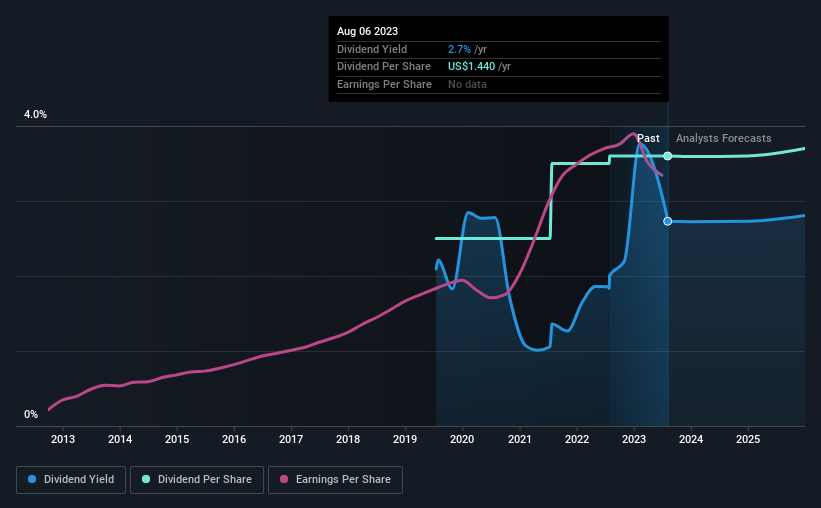Western Alliance Bancorporation (NYSE:WAL) Looks Interesting, And It's About To Pay A Dividend
Regular readers will know that we love our dividends at Simply Wall St, which is why it's exciting to see Western Alliance Bancorporation (NYSE:WAL) is about to trade ex-dividend in the next three days. The ex-dividend date is one business day before the record date, which is the cut-off date for shareholders to be present on the company's books to be eligible for a dividend payment. The ex-dividend date is important because any transaction on a stock needs to have been settled before the record date in order to be eligible for a dividend. Accordingly, Western Alliance Bancorporation investors that purchase the stock on or after the 10th of August will not receive the dividend, which will be paid on the 25th of August.
The company's next dividend payment will be US$0.36 per share. Last year, in total, the company distributed US$1.44 to shareholders. Based on the last year's worth of payments, Western Alliance Bancorporation has a trailing yield of 2.7% on the current stock price of $52.75. Dividends are a major contributor to investment returns for long term holders, but only if the dividend continues to be paid. So we need to check whether the dividend payments are covered, and if earnings are growing.
View our latest analysis for Western Alliance Bancorporation
If a company pays out more in dividends than it earned, then the dividend might become unsustainable - hardly an ideal situation. Western Alliance Bancorporation paid out just 17% of its profit last year, which we think is conservatively low and leaves plenty of margin for unexpected circumstances.
Companies that pay out less in dividends than they earn in profits generally have more sustainable dividends. The lower the payout ratio, the more wiggle room the business has before it could be forced to cut the dividend.
Click here to see the company's payout ratio, plus analyst estimates of its future dividends.
Have Earnings And Dividends Been Growing?
Companies with consistently growing earnings per share generally make the best dividend stocks, as they usually find it easier to grow dividends per share. Investors love dividends, so if earnings fall and the dividend is reduced, expect a stock to be sold off heavily at the same time. That's why it's comforting to see Western Alliance Bancorporation's earnings have been skyrocketing, up 22% per annum for the past five years.
Many investors will assess a company's dividend performance by evaluating how much the dividend payments have changed over time. Since the start of our data, four years ago, Western Alliance Bancorporation has lifted its dividend by approximately 9.5% a year on average. We're glad to see dividends rising alongside earnings over a number of years, which may be a sign the company intends to share the growth with shareholders.
The Bottom Line
Has Western Alliance Bancorporation got what it takes to maintain its dividend payments? Typically, companies that are growing rapidly and paying out a low fraction of earnings are keeping the profits for reinvestment in the business. Perhaps even more importantly - this can sometimes signal management is focused on the long term future of the business. Western Alliance Bancorporation ticks a lot of boxes for us from a dividend perspective, and we think these characteristics should mark the company as deserving of further attention.
On that note, you'll want to research what risks Western Alliance Bancorporation is facing. Our analysis shows 1 warning sign for Western Alliance Bancorporation and you should be aware of it before buying any shares.
A common investing mistake is buying the first interesting stock you see. Here you can find a full list of high-yield dividend stocks.
Have feedback on this article? Concerned about the content? Get in touch with us directly. Alternatively, email editorial-team (at) simplywallst.com.
This article by Simply Wall St is general in nature. We provide commentary based on historical data and analyst forecasts only using an unbiased methodology and our articles are not intended to be financial advice. It does not constitute a recommendation to buy or sell any stock, and does not take account of your objectives, or your financial situation. We aim to bring you long-term focused analysis driven by fundamental data. Note that our analysis may not factor in the latest price-sensitive company announcements or qualitative material. Simply Wall St has no position in any stocks mentioned.

